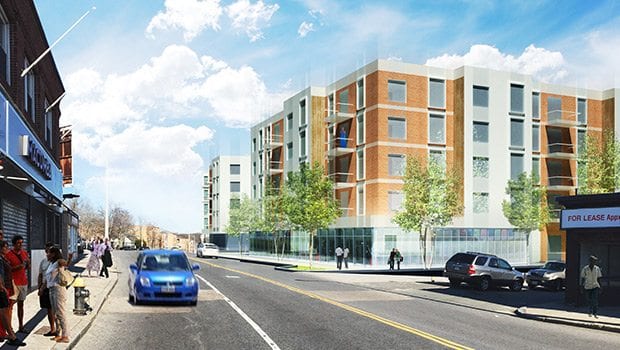
The MBTA officially has designated a development team to bring new life to the parking lot by the Mattapan Square bus and trolley station. Nonprofit organizations Preservation of Affordable Housing Inc. (POAH) and Nuestra Comunidad together will turn the underused lot into retail space and affordable and market-rate housing.
To secure the site, POAH-Nuestra‘s plan beat out a competing joint proposal from Trinity Financial Inc. and Codman Square Neighborhood Development Corporation. Under POAH-Nuestra’s vision, fewer housing units will be built, but more than double the retail space will be provided. Their proposal calls for 135 units of housing in two buildings, with 52 percent of units affordable to those earning up to 60 percent of area median income, and 10,000 square feet of retail space. Julie Creamer, POAH’s vice president of New Construction and Special Projects, said that current plans also call for at least 25 percent of the units to be made affordable to middle-income households earning 60 to 110 AMI (which amounts to $58,900 to $98,100 for a family of four, according to the Boston Redevelopment Authority). The number of middle-income affordable units may increase, contingent on available financing, and the rest of units will be left market rate.
Creamer said her developer team offered the MBTA the highest bid, although she would not specify the exact amount. The MBTA’s Request for Proposals placed the minimum bid at $1.5 million.
Instead of buying the property, the POAH-Nuestra team will lease it from the MBTA for 99 years and make annual payments for a number of those years, likely fewer than the full 99, she said.

Author: Photo: Courtesy of POAH and Nuestra ComunidadArtist rendering for the site.
Envisioning retail and housing
Creamer said that community members told her at local meetings that in the kinds of retail offered in the neighborhood tend to stay the same. At the Mattapan Square site, residents said they wanted to see a sit-down restaurant and a place where people can relax and have a conversation over coffee as well as other offerings that would fill retail gaps.
What is done there could inspire other businesses to take their cue, Creamer said.
“The [residents] really see [the project] as a catalyst for the rest of that area, so it’s important for them that we fill a niche and also hopefully bring attention to that area and to the needs of the community there,” Creamer said. “I think they feel a little bit that what’s there is the same as what it’s always been, that there’s nothing new or exciting happening there relative to the impact on the community.”
The housing portion of the project also will strengthen the neighborhood, she said. Against a backdrop of growing rents and high housing demand in Boston, providing affordable housing is important to maintaining Mattapan’s community, she said.
“Housing that comes into Mattapan that doesn’t carry with it a long-term affordability in our minds isn’t serving the needs of that community,” Creamer told the Banner. “We feel our plan is really going to help keep Mattapan the community it is and wants to remain.”
More projects to come?
This project could lead to more. David Price, executive director of Nuestra Comunidad, said that while Nuestra is not new to Mattapan, this project could introduce it more widely to the neighborhood.
“To the extent this helps introduce us and POAH to the rest of Mattapan, I think that will be helpful in a general way,” Price told the Banner.
Nuestra purchased and renovated the 95-unit Adams Court Development on River Street twelve years ago and has been an active partner of Mattapan Food and Fitness Coalition, Price said. Currently, the development corporation is looking into other potential projects in the area, particularly ones with homeownership opportunities and on a smaller scale than this one. They have not yet singled one out to pursue.
Timeline
There is much to be done on the project.
Soon the team will start on the “due diligence” phase of work, which includes examining the physical conditions of the property to determine how best to site building structures, as well as researching the potential impacts on areas such as traffic, as part of the Boston Redevelopment Authority Article 80 process. This could take about eight months, Creamer said.
The developer team also is moving to secure financing. Price said that in addition to pursuing conventional loans and state or city subsidies for providing affordable housing, the team also expects to acquire funds under a Mass Housing program targeted at financing workforce housing. The lease arrangement also was an important part to making the project’s financing work, Creamer said.
Further permitting as well as community engagement also will be needed. Creamer said that community meetings likely will be scheduled this summer and that she hopes to be ready to begin construction by 2018.






